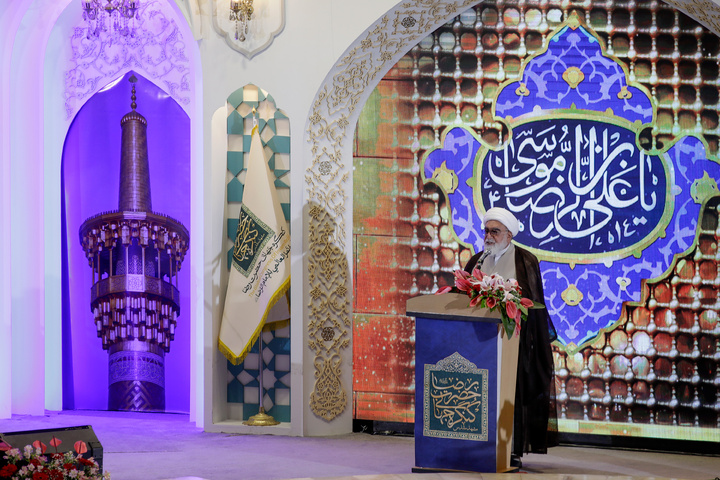AQR’s Custodian emphasized that returning to the teachings of Ahl al-Bayt is the key to addressing humanity’s moral and ethical challenges. “In Imam Reza’s school of thought, human dignity originates from divine essence”.
Ayat. Ahmad Marvi addressed the gathering at the 6th International Congress of Imam Reza, held simultaneously with the Karamat Ten-Day Celebrations and on the eve of Imam Reza’s blessed birth anniversary.
The congress focused on human rights and dignity, benefiting from the teachings of Ahl al-Bayt, particularly Imam Reza’s wisdom.
Attended by Dr. Masoud Pezeshkian, President of Iran, alongside national scientific and cultural officials and intellectuals from 21 countries, the event was held on May 5, at Quds Hall in the shrine complex (northeast Iran).
Ayat. Marvi addressed the moral and human crises of the present age, emphasizing the urgent need to return to Ahl al-Bayt’s teachings. “At a time when ignorance, oppression, and deception obscure reality and self-proclaimed defenders of human rights act against them, humanity needs more than ever to turn to the pure sources of divine knowledge.”
He underscored that human dignity in Imam Reza’s teachings is neither a political nor a social matter. “Instead, dignity stems from humanity’s divine nature. Dignity, according to Imam Reza, is not granted or revoked based on political interests or social relations; rather, it is an intrinsic truth, tied to creation itself and defined within the framework of divine servitude”.
Citing the Hadith known as Silsilat al-Dhahab, Ayat. Marvi declared: “From Imam Reza’s perspective, humans remain honorable and noble as long as they do not stray from the path of servitude and divine guardianship”.
He explained that Imam Reza’s monotheistic worldview presents humans as reflections of divine names and attributes, with the potential to attain the status of God’s vicegerency.
The Custodian pointed to genocide, hunger, environmental destruction, and widespread poverty, stating, “Human rights today have become instruments in the hands of oppressors, deepening the gap between ideals and reality”.
He argued that, in such conditions, followers of Imam Reza’s teachings bear the responsibility to provide a comprehensive perspective on human dignity from Ahl al-Bayt’s viewpoint and respond to humanity’s epistemological needs.
The Custodian of Astan Quds Razavi elaborated on Imam Reza’s ethical conduct, stating, “Whether interacting with fellow believers, engaging with followers of other faiths, addressing allies, or debating opponents, Imam Reza always upheld respect, dignity, and protection of human honor. With his patience and scholarly steadfastness, Imam Reza set a precedent for interfaith and intercultural dialogue, rooted in respect, rationality, and safeguarding the dignity of his audience”.
“In Imam Reza’s worldview, individual and social ethics are intertwined. Qualities such as justice, forbearance, honesty, and compassion are not just moral virtues; rather, they reflect sacred dignity within a person. These attributes, he stressed, must be institutionalized within personal interactions, as well as within social and political frameworks”, he added.
Citing a well-known account from Imam Reza’s life, Ayat. Marvi narrated: “Whenever Imam Reza laid out a meal, neither differences in race nor distinctions in social status prevented people—from servants to attendants—from sharing the same table. On one occasion, a guest suggested that Imam Reza set up a separate table for servants, to which the Imam replied: "Our father and mother are one, and distinction is based on deeds, not social rank." This approach, Ayat. Marvi noted, is a practical embodiment of the Qur’anic verse: "Indeed, the most honored of you in the sight of God is the most righteous among you." (49:13).
He elaborated that dignity in Imam Reza’s teachings is not based on wealth, power, or lineage but on sincere servitude and genuine piety.
The Ayatollah described how Imam Reza not only took the lead in assisting the needy but also preserved their dignity in the process, sometimes providing financial aid as loans to protect their self-respect, ensuring he never saw the face of the one in need, so their dignity remained intact.
“Speaking of human dignity without addressing "freedom’ is impossible in Imam Reza’s teachings, as liberty is an inherent aspect of human nature”, Ayat. Marvi emphasized.
He explained that the Imam repeatedly reinforced humanity’s free will, stressing that humans are created free so that, through reason and choice, they can pursue the path of divine guidance. Any form of dictatorship, tyranny, or human degradation contradicts the fundamental principle of human creation.
He stressed that today’s world is thirsty for an intellectual approach that offers a comprehensive and sacred view of human dignity.
“Scholars and intellectuals must promote these teachings in all arenas—thought production, media, digital platforms, cultural diplomacy, and academic institutions—just as Imam Reza himself, through his eloquent discourse and noble conduct, preserved the legacy of Ahl al-Bayt throughout history”, the top official urged.
Ayat. Marvi highlighted the exceptional role of the International Congress of Imam Reza in advancing Ahl al-Bayt’s teachings.
He further called for expanding the congress’s academic and cultural impact, noting that the event can serve as a foundation for a global movement toward justice, human rights, and dignity, based on divine principles.
Referring to Islamic civilization, the custodian emphasized that its ontological foundation is monotheism, its ultimate goal is justice, its epistemological basis is spirituality, and its anthropological framework is dignity.
He described these principles as a clear structure for designing a just and humane future, founded upon Islamic teachings.
Stating that “the future of humanity is shaped by our present choices”, Ayat. Marvi urged scholars, policymakers, and global intellectuals to take decisive steps today in preserving human dignity through faith and insight, ensuring that tomorrow’s world will be one where fundamental rights—including life, security, thought, faith, and dignity—are upheld for all people.

At the 6th International Congress of Imam Reza, Ayat. Ahmad Marvi, the Custodian of Astan Quds Razavi (AQR), underscored the urgency of returning to the teachings of Ahl al-Bayt as the ultimate solution to humanity’s moral and ethical crises, emphasizing that true dignity stems from divine essence rather than political or social constructs.
News Code 6307

Your Comment